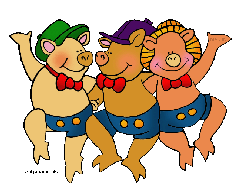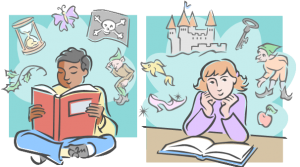CREATIVE WRITING
CREATIVE WRITING
Children, by nature are creative and imaginative, but we need to stimulate this imagination and encourage it to develop. Having read the poem “The Worlds Outside my Window” to an assembly of infant school children, they honed in specifically on one element of the poem (Wish World) and began to tell me in detail what it was like in Wish World. They had so many ideas, and as a group continued to fire off one another and enthuse more. The result was another poem specifically describing Wish World! This is what teaching creative writing is all about; stimulating and expressing ideas.
A great benefit to creative writing is that if the ideas are naturally fast flowing, the child can concentrate on other techniques that take more effort, such as choosing appropriate words to include alliteration, assonance, etc (see figurative writing). It also provides enormous potential for nonsense and humour: Enough said!
I have listed a few of my own poems on this page, but have also give you a few other ideas to work on below:
Tell a fairy tale from another perspective:
- Maybe the Wolf was just trying to make friends with the 3 pigs and they wouldn’t talk to him.
- Maybe write a letter from the giant to Jack asking why he stole his precious golden hen; the giant never did him any harm!
Imagine an alien and describe him and his visit to earth. What did he think of everything he saw. Remember that the simplest of things might be puzzling to him. Did he come in peace or was he threatening? What did he find scary or odd about earth?
Describe an undiscovered planet or world. Imagine what life inhabits it, what plants grow, what the aliens do, how they talk and behave. Are they friendly?
Create a new animal species, or a monster or dinosaur.
Put an animal or person somewhere that they would not normally be and describe the experience.

Give an animal or object a voice
- How does the football feel when it’s is kicked around? Very different from the moment an excited child opened it as a present on Christmas day and hugged it! Is it confused about the change?
How does the chair feel when it is sat upon; write a diary of all the different visitors it’s had. If you’re feeling very childish and revolting try writing a diary of a day in the life of a toilet seat!
Write a story poem using the voice of ,for example,a cat who chases mice, gets chased by a dog, locked out at night, claims its territory etc, all from the cat’s perspective.
If you’re stuck for ideas, make that your subject!
Write down how frustrating it is when you feel uninspired. Use a letter format, or a conversational tone (see my example poem “A Poem for the Teacher”)
Describe what the inside of your head looks like when you’re stuck for ideas. For example, imagine the question or title of your work being bounced about by little people in your head, but going no-where. Talk to those annoying characters, ask for their help, describe them, involve them in your frustration. Tell them what you think of your task, or your teacher, and appeal for their sympathy.
Use a list poem and find ways to describe the emptiness (see my example poem “Uninspired”)
Imagine that you are Adam in the Garden of Eden and are seeing some animals for the first time, then write about them in your diary. Describe what they look like, and what ideas you and Eve have had about naming them. Maybe you saw how the elephant got his trunk, and what happened to make the giraffes neck so long.
What did Noah feel like when he was building the ark? Did people poke fun at him? What conversations did he have with his wife? How did he get all of the animals onto the ark? Write this as a diary, letter or story poem.
On a serious note, what was a day in the life of a slave like,? How did they feel? Did they notice the injustice, or try to rebel? Describe the things that happened.
One last tip!
Don’t stifle the creativity by trying to write a specific poem form that is too restrictive. If you include rhyme, rhythm, syllable count, a specific poem form, a topic, alliteration etc it will become too great a challenge to achieve everything at once. On the other hand, if you focus on a couple of them, maybe alliteration and creative writing, you will make much more progress. Have fun, and eventually, the techniques that you practice individually will become second nature and you can include an extra challenge: DON’T PUT YOURSELF OFF BY SETTING YOUR TARGET TOO HIGH!



Comments on this entry are closed.